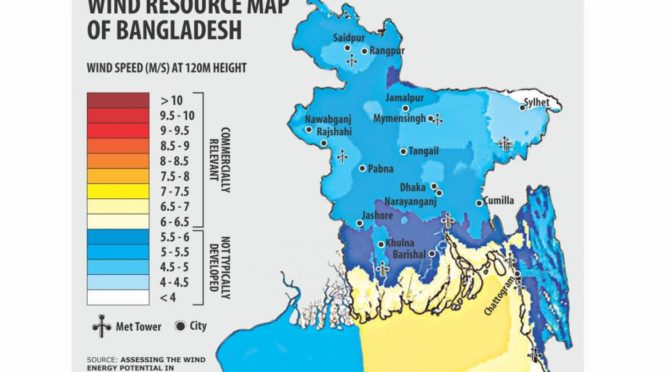Until now, only three wind turbines with 3MW of capacity have been in operation for the last couple of years in Feni and coastal Kutubdia. Bangladesh’s southern coastal belt offers potential for generating power through wind energy, according to a recently published study by the US Department of Energy’s National Renewable Energy Laboratory, raising hopes of meeting the government’s renewable energy goals. The government has targeted to generate 2,470 megawatts of electricity by 2021 through renewable sources, 1,153MW of which was supposed to have been achieved by this year. In reality, the government is nowhere near hitting that target.
The study, carried out on behalf of the power division, found that coastal areas of Khulna, Barishal and Chattogram divisions have more than 6 metres per second (m/s) wind speed at 120-metre height, sufficient for generating electricity from wind turbines.
For wind speeds of 5.75-7.75 m/s, there are more than 20,000 square kilometres of land with a gross wind potential of more than 30,000MW, said the report styled “Assessing the Wind Energy Potential in Bangladesh”.
“Although this estimate is not realistic when proper filters are applied to screen out undesirable land for wind development, it suggests that Bangladesh’s 10 percent renewable target by 2021 is achievable,” the report said.
The wind turbine in Feni, with the blades’ centrepoint 50 metres above the ground, has so far generated 588,334 kilowatt hours of electricity since resuming operations in April 2014 after repairs.
It cannot always supply the generated electricity to the national grid for various reasons.
The wind turbines in Kutubdia island, each of 1MW capacity and with the blades’ centrepoint 18 metres above the ground, are yet to run in full capacity.
Since June 2016, 149,582kW of electricity was supplied by the wind turbines, according to Bangladesh Power Development Board (BPDB), which installed the turbines.
The latest study, jointly funded by the USAID and the government, has been done to develop a national wind resource assessment.
Data were collected from nine meteorological sites representing all geographical regions of Bangladesh from June 2014 to December 2017, according to the report.
The results of the wind resource assessment will help Bangladesh overcome the significant energy challenges, the report said citing the country’s power shortage against the backdrop of increasing demand and dwindling natural gas reserves.
Data obtained for the study will support informed decision making, ranging from policy and investment decisions to reliable power sector planning.
Specifically, the Bangladesh wind resource assessment will help reduce technical risks and raise interest of the private sector on the nascent wind market in the country, it said.
On the issue of whether wind energy can compete with the local wholesale energy market, the report said, “Although this work is an important first step, other data inputs are needed to answer this question, including turbine selection and knowledge of the unsubsidised cost of wholesale power.”
The report, among others, recommended the government analyse installation and financing costs for wind energy and compare against the current 20-year forecasts for Bangladesh’s cost of power.
This is the first ever study on wind resource potential in Bangladesh, said an official of the Sustainable and Renewable Energy Development Authority (Sreda).
“It will give an idea to policymakers and investors,” he said, adding that an investor would require collecting site specific wind and land data if he/she wants to set up wind turbines in the potential areas for wind energy.
A working committee has been formed at Sreda to frame a guideline on wind energy. Sreda also has plans to take up a project to set up three towers to collect site specific data in areas including Kuakata of Patuakhali.
A committee has been formed to conduct in-house feasibility study on the wind energy potential in Mongla and Chandpur based on the report, said Md Nazmul Haque, director of renewable energy of the BPDB.
thedailystar.net



